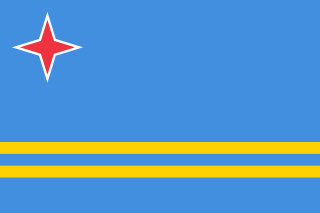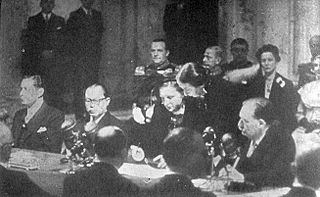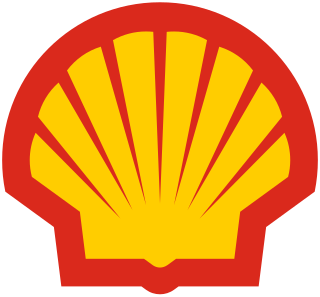
Aruba is an island and a constituent country of the Kingdom of the Netherlands in the southern Caribbean Sea, located about 1,600 kilometres (990 mi) west of the main part of the Lesser Antilles and 29 kilometres (18 mi) north of the coast of Venezuela. It measures 32 kilometres (20 mi) long from its northwestern to its southeastern end and 10 kilometres (6 mi) across at its widest point. Together with Bonaire and Curaçao, Aruba forms a group referred to as the ABC islands. Collectively, Aruba and the other Dutch islands in the Caribbean are often called the Dutch Caribbean.

Afrikaans is a West Germanic language spoken in South Africa, Namibia and, to a lesser extent, Botswana and Zimbabwe. It evolved from the Dutch vernacular of South Holland spoken by the mainly Dutch settlers of what is now South Africa, where it gradually began to develop distinguishing characteristics in the course of the 18th century. Hence, it is a daughter language of Dutch, and was previously referred to as "Cape Dutch" or "kitchen Dutch". However, it is also variously described as a creole or as a partially creolised language. The term is ultimately derived from Dutch Afrikaans-Hollands meaning "African Dutch".

The Indonesian National Revolution, or Indonesian War of Independence, was an armed conflict and diplomatic struggle between the Republic of Indonesia and the Dutch Empire and an internal social revolution during postwar and postcolonial Indonesia. It took place between Indonesia's declaration of independence in 1945 and the Netherlands' recognition of Indonesia's independence at the end of 1949.

Willem-Alexander is the King of the Netherlands, having ascended the throne following his mother's abdication in 2013.

Korendijk listen is a municipality on the Hoeksche Waard Island in the western Netherlands, in the province of South Holland. The municipality covers an area of 100.47 km2 (38.79 sq mi) of which 23.21 km2 (8.96 sq mi) is water.

Oostflakkee[ˌoːstflɑˈkeː](listen) is a former municipality on the island of Goeree-Overflakkee in the western Netherlands, in the province of South Holland. The former municipality covered an area of about 107 km², and had a population of about 10,000 in 2007. On January 1, 2013, Oostflakkee merged with Goedereede, Dirksland, and Middelharnis into the new municipality of Goeree-Overflakkee.

Goeree-Overflakkee is the southernmost delta island of the province of South Holland, Netherlands. It is separated from Voorne-Putten and Hoeksche Waard by the Haringvliet, from the mainland of North Brabant by the Volkerak, and from Schouwen-Duiveland by Lake Grevelingen.

The Dutch colonial empire comprised the overseas territories and trading posts controlled and administered by Dutch chartered companies and subsequently by the Dutch Republic (1581–1795), and by the modern Kingdom of the Netherlands after 1815. It was initially a trade-based system which derived most of its influence from merchant enterprise and from Dutch control of international maritime shipping routes through strategically placed outposts, rather than from expansive territorial ventures. With a few notable exceptions, the majority of the Dutch colonial empire's overseas holdings consisted of coastal forts, factories, and port settlements with varying degrees of incorporation of their hinterlands and surrounding regions. Dutch chartered companies often dictated that their possessions be kept as confined as possible in order to avoid unnecessary expense, and while some such as the Dutch Cape Colony and Dutch East Indies expanded anyway, others remained undeveloped, isolated trading centres dependent on an indigenous host-nation. This reflected the primary purpose of the Dutch colonial empire: commercial exchange as opposed to sovereignty over homogeneous landmasses.

The Eredivisie is the highest echelon of professional football in the Netherlands. The league was founded in 1956, two years after the start of professional football in the Netherlands. At the 2018–2019 season it was ranked the 11th best league in Europe by UEFA.

A consultative referendum on the Treaty establishing a Constitution for Europe was held in the Netherlands on 1 June 2005 to decide whether the government should ratify the proposed Constitution of the European Union. The result was a "No"-vote.
Dutch people or the Dutch are a Germanic ethnic group native to the Netherlands. They share a common culture and speak the Dutch language. Dutch people and their descendants are found in migrant communities worldwide, notably in Aruba, Suriname, Guyana, Curaçao, Argentina, Brazil, Canada, Australia, South Africa, New Zealand, and the United States. The Low Countries were situated around the border of France and the Holy Roman Empire, forming a part of their respective peripheries, and the various territories of which they consisted had become virtually autonomous by the 13th century. Under the Habsburgs, the Netherlands were organised into a single administrative unit, and in the 16th and 17th centuries the Northern Netherlands gained independence from Spain as the Dutch Republic. The high degree of urbanization characteristic of Dutch society was attained at a relatively early date. During the Republic the first series of large-scale Dutch migrations outside of Europe took place.

The Battle of the Netherlands was a military campaign part of Case Yellow, the German invasion of the Low Countries and France during World War II. The battle lasted from 10 May 1940 until the surrender of the main Dutch forces on 14 May. Dutch troops in the province of Zeeland continued to resist the Wehrmacht until 17 May when Germany completed its occupation of the whole country.

Zuidzijde is a town in the Dutch province of South Holland. It is a part of the municipality of Korendijk, and lies approximately 7 km south of Spijkenisse.
Zuidzijde is the name of several Dutch villages:

Dutch(Nederlands ) is a West Germanic language spoken by around 23 million people as a first language and 5 million people as a second language, constituting the majority of people in the Netherlands and Belgium. It is the third most widely spoken Germanic language, after its close relatives English and German.

Royal Dutch Shell plc, commonly known as Shell, is a British-Dutch oil and gas company headquartered in the Netherlands and incorporated in the United Kingdom. It is one of the six oil and gas "supermajors" and the fifth-largest company in the world measured by 2018 revenues. Shell was first in the 2013 Fortune Global 500 list of the world's largest companies; in that year its revenues were equivalent to 84% of the Dutch national $556 billion GDP.

The Dutch East Indies was a Dutch colony consisting of what is now Indonesia. It was formed from the nationalised colonies of the Dutch East India Company, which came under the administration of the Dutch government in 1800.

Flemish (Vlaams) also called Flemish Dutch (Vlaams-Nederlands), Belgian Dutch, or Southern Dutch (Zuid-Nederlands), is a Lower Franconian / Dutch dialect. It is spoken in the whole northern region of Belgium as well as French Flanders and the Dutch Zeelandic Flanders by approximately 6.5 million people. The term is used in at least five ways. These are:
- as an indication of Dutch written and spoken in Flanders including the Dutch standard language as well as the non-standardized dialects, including intermediate languages between dialect and standard. Some linguists avoid the term Flemish in this context and prefer the designation Belgian-Dutch or South-Dutch.
- as a synonym for the so-called intermediate language in Flanders region, the Tussentaal.
- as an indication for the non-standardized dialects and regiolects of Flanders region.
- as an indication of the non-standardized dialects of only the former County of Flanders, ie the current provinces of West Flanders and East Flanders, Zeelandic Flanders and Frans-Vlaanderen.
- as an indication of the non-standardized West Flemish dialects of the province of West Flanders, the Dutch Zeelandic Flanders and French Frans-Vlaanderen.


















